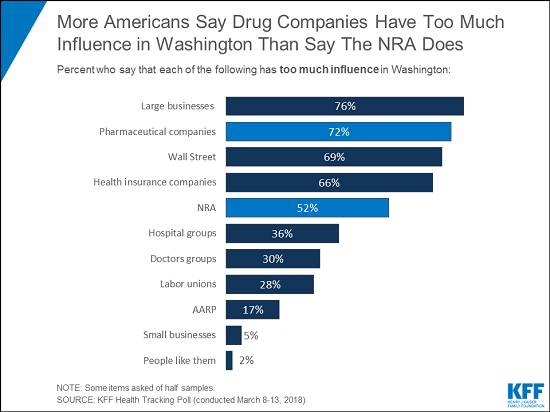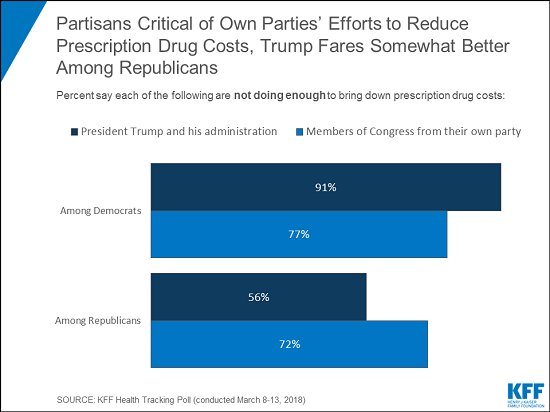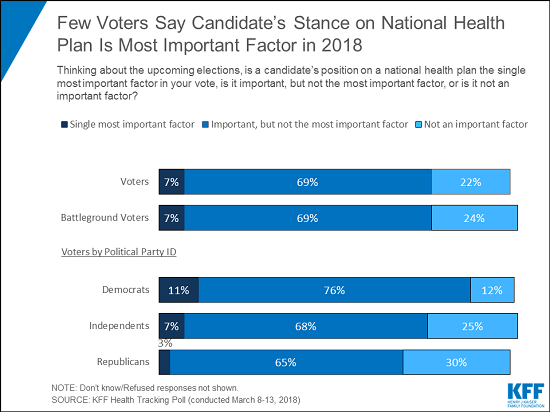|
Just Released
|
||
|
Poll: Public Says Drug Companies Have More Influence in Washington
than the NRA
Most Americans Say the White House
and Both Republicans and Democrats in Congress Aren’t Doing Enough to Address
High Drug Costs
Democrats Split on Whether to Fix
the ACA or Push for a National Health Plan; Few Democratic Voters Say a
National Health Plan is Their Top Issue for the Midterms
As policymakers weigh
strategies to address the high cost of prescription drugs, the latest Kaiser Health Tracking Poll finds that a
large majority of the public (72%) view pharmaceutical companies as having
too much influence in Washington – more than say the same about the National
Rifle Association (NRA).
Drug makers rank among
the top tier of groups that Americans say have too much influence in
Washington, along with large businesses (76%), Wall Street (69%), and health
insurance companies (66%). All of these organizations rank higher than the
NRA (52%), which has been at the center of the debate about school safety and
gun laws following recent school shootings and subsequent protests.
One reason why drug companies rank so high on this
list is that both Democrats (65%) and Republicans (74%) see them as having
too much influence in Washington. In contrast, Democrats are far more likely
than Republicans to say the NRA has too much influence (73% compared to 21%).
Across Parties, Majorities Say the
Administration and Congress Aren’t Doing Enough on Drug Costs
Most of the public (80%) view prescription drug
costs as unreasonable, and about half (52%) say passing legislation to bring
down prescription costs should be a “top priority” for President Trump and
Congress – more than say the same about five other issues tested, including
passing an infrastructure bill (45%), ending the prescription opioid epidemic
(42%), and repealing the Affordable Care Act (28%). Reducing the cost of
prescription drugs continues to be a top priority among the public during
President Trump’s administration as noted in previous KFF surveys.
At the same time, a minority of the public (39%)
expresses confidence that President Trump and his administration will deliver
on their promises to lower drug costs, and an even smaller share (28%) say
that they are confident the administration will deliver on its promise to end
the opioid epidemic.
Overall, at least three in four say that
Congressional Republicans (83%), Congressional Democrats (82%), and President
Trump and his administration (77%) aren’t doing enough to bring drug costs
down.
Unlike other issues such as repealing the
Affordable Care Act or creating a national health plan, the poll does not
find a sharp partisan divide on this perception. Most Democrats (77%) say
that Congressional Democrats aren’t doing enough, while most Republicans say
that Congressional Republicans (72%) and President Trump and his
administration (56%) aren’t doing enough.
Democrats
Divided on What Their Party Should Focus On Next, But Few Say National Health
Plan Will Be Major Factor in Their 2018 Vote
Looking ahead to the
2018 midterms, the polling at this point suggests that candidates’ positions
on a national health plan are not likely to play a major role in the
elections. While Democrats are divided in whether their party should focus on
improving the way the ACA is working (46%) or focus on passing a national
health care plan (48%), few Democratic voters (11%) say a candidate’s
position on a national health plan will be the “single most important factor”
in their vote.
While still not a major campaign issue, the poll
finds that most of the public (59%) favor a national health plan, or
Medicare-for-all, in which all Americans would get their insurance from a
single government plan. This includes a majority of Democrats (75%) and
independents (58%), and one-third of Republicans (36%).
Support for such a proposal increases among the
overall public (75%) and among partisans (87% of Democrats, 74% of
independents, and 64% of Republicans) when framed as an option for anyone who
wants it, but allows people who currently have other forms of coverage to
keep it. It is unclear how support would fare if these proposals became part
of the larger public debate as previous KFF polling has found the public’s
attitudes can be quite malleable.
Designed and analyzed by public opinion researchers
at the Kaiser Family Foundation, the poll was conducted from March 8-13, 2018
among a nationally representative random digit dial telephone sample of 1,212
adults. Interviews were conducted in English and Spanish by landline (421)
and cell phone (791). The margin of sampling error is plus or minus 3
percentage points for the full sample. For results based on subgroups, the
margin of sampling error may be higher.
Filling
the need for trusted information on national health issues, the
Kaiser Family Foundation is a nonprofit organization based in San Francisco,
California.
|
||
|
||
To be a Medicare Agent's source of information on topics affecting the agent and their business, and most importantly, their clientele, is the intention of this site. Sourced from various means rooted in the health insurance industry - insurance carriers, governmental agencies, and industry news agencies, this is aimed as a resource of varying viewpoints to spark critical thought and discussion. We welcome your contributions.
Friday, March 23, 2018
Public Says Drug Companies Have More Influence in Washington than the NRA
Subscribe to:
Post Comments (Atom)




No comments:
Post a Comment